The Ahab is only Noodler's second pen with a flexible nib, following the original Noodler's flex, but it has subtly moved upscale without a corresponding increase in price. Yes, the price is up slightly but you get so much more with this pen than with the first flex. It is worth every extra dollar, but read on, don't take my word for it.
Body and materials
The Ahab is made from Noodler's usual material: vegetal resin. As a result, you will be confronted by the peculiar smell that, those of us who have sampled Noodler's pens before, have gotten used to. The smell offends some people and leaves others indifferent. I'm somewhere in the middle but I've learned not to sweat it. The smell does go away after a while. To speed it along, I would recommend washing the pen with water and soap before you use it the first time.
My pen is yellow, or more precisely Mandarin Yellow. It is my second yellow fountain pen and it's a very bright color at that. My other yellow pen is the Pilot Prera and I just had to compare the two side by side to show you how similar the colors are.
To me, the Prera does have the more enjoyable color, as its yellow is warmer. The Pilot pen also has better materials and a better finish but Noodler's is not far behind.
Going back to materials, Ahabs come in various color schemes. I said "color schemes" deliberately because most of them are one main color with swirls of another color intermixed. There's the inevitable clear demonstrator and I know that some colored demonstrators are about to be launched shortly. This Mandarin Yellow pen is one of the few that are a single color. Another reason to like it, for me at least.
The Ahab has a twist-on cap which takes about 2 1/4 turns to come off. The cap features a wide silver trim band with the words "Noodler's Ink" inscribed on it.
The cap posts easily and securely on the end, but I never feel the need to do so, because the pen is large enough to make this unnecessary. In either case, balance remains very good, thanks to the low weight of the pen.
A large finial holds the interesting-looking clip. The story behind the clip is that Nathan Tardiff, Noodler's owner, wanted it to resemble a whale, and it does. In fact the pen itself is a sort of homage to the infamous Captain Ahab from Moby Dick, and it's meant to represent the Captain's wooden leg. The clip is, indeed, unique in the world of fountain pens. It, too, has the words "Noodler's Ink" engraved on it. The clip is not too stiff but it holds on to a shirt pocket well enough. Being smooth, it also slips on easily.
Dimensions and weight
The Ahab is Noodler's largest fountain pen, so far. That's just one of the many reasons why I purchased it. To me this feels like a proper "fat" pen. Not only is it much easier to hold than the piston-filler/original flex, but it is also much more comfortable when used for extended periods. Here are some quantifiable dimensions:
Length capped: 140mm / 5.5in
Length uncapped and un-posted: 128mm / 5in
Length of cap: 60mm / 2.36in
Length of nib: 21mm / 0.83in
Length with cap posted: 170mm / 6.7in
As I already mentioned, the Ahab is surprisingly light. While this is perfect for me, others may find that posting it gives it better balance. I find it very well balanced without needing to post the cap. I only post caps as a last resort, when the pen is too short or too light but this is not the case.
Because I don't have a scale, I will try to give you another point of reference: the Ahab is a bit lighter than the TWSBI Diamond 530 but not by a lot.
Because I don't have a scale, I will try to give you another point of reference: the Ahab is a bit lighter than the TWSBI Diamond 530 but not by a lot.
Filling mechanism
In my short career as fountain pen appreciator, this is best filling system I have come across. It even beats the TWSBI, although the latter is more precisely crafted. Where the Ahab excels is the modularity and ease of disassembly. The following image shows how the pen can be taken apart into its base components. I chose not to remove the rubber o-rings and the clip but those can also be removed if you so desire.
The Ahab's piston filling mechanism is amazing for several reasons.
First, the ink reservoir is not friction fit. Instead, it screws on to the section. This makes for an extremely secure connection. There's no guessing if you stuck it in correctly or worrying that it might leak. Besides, it also features a rubber seal where it meets the section, to ensure an air-tight fit.
Second, the piston can be removed easily by unscrewing the black nub and pushing the shaft out through the large opening (the one with the threads). The piston o-ring can also be easily replaced by slipping it off. Speaking of the o-ring, this particular version is already obsolete. There's a new, double wall o-ring that's supposed to be even better, and newer batches of Ahabs should have it pre-installed. In my case, I opted to buy a set of 2 replacement o-rings along with my pen, for only $1 extra. And that's just for peace of mind because I don't anticipate this o-ring to ever go bad.
Third, the piston rod itself is hollow. Yup, when filling with ink you should pull the piston once, then push it in to expel the ink and remaining air, then pull it once again. If you do this correctly, ink will go both inside the piston rod and the ink reservoir. This makes for even more capacity. Notice the ink-filled rod in the image below.
But wait, there's more! This is a flex pen after all. Flex pens have a tendency to gulp gallons of ink, potentially requiring you to refill often. If you are still not satisfied with the ink capacity of the Ahab's reservoir (which, by the way, is bigger than the original Noodler's flex), there's one more solution for you: remove the piston and use the entire barrel as a reservoir, converting the pen to an eyedropper with an incredible 6ml of capacity. If that is your intention, I would recommend a transparent demonstrator so you can always see the ink levels.
What can I say, I don't have enough words to praise this system. Despite all this you will still think I'm crazy when I am going to tell you that I used a syringe to fill this pen. Yes, I know, that's sacrilege, but I happen to think that using a syringe is way less messy than dipping the whole section in ink. Not only does it prevent a mess, but it is also more economical because no ink is wasted and the ink bottle won't be contaminated with who-knows-what when you dip the pen in it.
In my short career as fountain pen appreciator, this is best filling system I have come across. It even beats the TWSBI, although the latter is more precisely crafted. Where the Ahab excels is the modularity and ease of disassembly. The following image shows how the pen can be taken apart into its base components. I chose not to remove the rubber o-rings and the clip but those can also be removed if you so desire.
The Ahab's piston filling mechanism is amazing for several reasons.
First, the ink reservoir is not friction fit. Instead, it screws on to the section. This makes for an extremely secure connection. There's no guessing if you stuck it in correctly or worrying that it might leak. Besides, it also features a rubber seal where it meets the section, to ensure an air-tight fit.
Second, the piston can be removed easily by unscrewing the black nub and pushing the shaft out through the large opening (the one with the threads). The piston o-ring can also be easily replaced by slipping it off. Speaking of the o-ring, this particular version is already obsolete. There's a new, double wall o-ring that's supposed to be even better, and newer batches of Ahabs should have it pre-installed. In my case, I opted to buy a set of 2 replacement o-rings along with my pen, for only $1 extra. And that's just for peace of mind because I don't anticipate this o-ring to ever go bad.
Third, the piston rod itself is hollow. Yup, when filling with ink you should pull the piston once, then push it in to expel the ink and remaining air, then pull it once again. If you do this correctly, ink will go both inside the piston rod and the ink reservoir. This makes for even more capacity. Notice the ink-filled rod in the image below.
But wait, there's more! This is a flex pen after all. Flex pens have a tendency to gulp gallons of ink, potentially requiring you to refill often. If you are still not satisfied with the ink capacity of the Ahab's reservoir (which, by the way, is bigger than the original Noodler's flex), there's one more solution for you: remove the piston and use the entire barrel as a reservoir, converting the pen to an eyedropper with an incredible 6ml of capacity. If that is your intention, I would recommend a transparent demonstrator so you can always see the ink levels.
What can I say, I don't have enough words to praise this system. Despite all this you will still think I'm crazy when I am going to tell you that I used a syringe to fill this pen. Yes, I know, that's sacrilege, but I happen to think that using a syringe is way less messy than dipping the whole section in ink. Not only does it prevent a mess, but it is also more economical because no ink is wasted and the ink bottle won't be contaminated with who-knows-what when you dip the pen in it.
Nib and feed
In classic Noodler's tradition, the Ahab sports an ebonite feed but this time it is much larger than previous pens, and so is the nib. The nib, in fact, is humongous. It has the same general design as the original Noodler's flex: the nib is split along more than half of its length, and it doesn't have a breather hole. This design allows it to flex, despite being made from steel. Steel, unfortunately, doesn't flex as easily as gold but you can't have gold in a $20 pen, can you?
Whatever Nathan did with this nib, it worked, because it seems to flex more easily than the previous pen. Here's a comparison between the nibs and feeds for the two pens, first with the feed shown from above...
and then with the feed shown from below.
Notice how much larger both of them are. One interesting thing I've noticed about the feed is that the large central groove on the top side is not centered. I was afraid this might have a negative effect on ink flow but I shouldn't have worried.
At the end of the big feed is a hole which takes a thin breather tube. This tube will fit inside the piston rod when it is pushed all the way down. It helps draw ink into the rod when filling with ink. Removing the breather tube apparently has no effect on ink flow, as reported by other users of the Ahab.
There's one more thing that I would like to mention, and it's about how the nib and feed are inserted into the section. As before, they are friction fit. Previous models, however, did not offer any means of helping you align the two. The Ahab, though also friction fit, has a small groove cut in the section that helps you align the nib and feed by allowing them to be inserted only in a certain position. Notice the following image:
The nib goes above the two arrows (the smaller arc), while the feed goes below (the larger arc). This is a great feature because it was always hard to get the perfect alignment before. I discovered it entirely by chance while cleaning the pen for the first time.
As usual, you can adjust the depth of the nib and feed inside the section, which modulates the flow of the ink.
Once again, I applaud the simple, yet well thought design of the section, nib and feed.
In classic Noodler's tradition, the Ahab sports an ebonite feed but this time it is much larger than previous pens, and so is the nib. The nib, in fact, is humongous. It has the same general design as the original Noodler's flex: the nib is split along more than half of its length, and it doesn't have a breather hole. This design allows it to flex, despite being made from steel. Steel, unfortunately, doesn't flex as easily as gold but you can't have gold in a $20 pen, can you?
Whatever Nathan did with this nib, it worked, because it seems to flex more easily than the previous pen. Here's a comparison between the nibs and feeds for the two pens, first with the feed shown from above...
and then with the feed shown from below.
Notice how much larger both of them are. One interesting thing I've noticed about the feed is that the large central groove on the top side is not centered. I was afraid this might have a negative effect on ink flow but I shouldn't have worried.
At the end of the big feed is a hole which takes a thin breather tube. This tube will fit inside the piston rod when it is pushed all the way down. It helps draw ink into the rod when filling with ink. Removing the breather tube apparently has no effect on ink flow, as reported by other users of the Ahab.
There's one more thing that I would like to mention, and it's about how the nib and feed are inserted into the section. As before, they are friction fit. Previous models, however, did not offer any means of helping you align the two. The Ahab, though also friction fit, has a small groove cut in the section that helps you align the nib and feed by allowing them to be inserted only in a certain position. Notice the following image:
The nib goes above the two arrows (the smaller arc), while the feed goes below (the larger arc). This is a great feature because it was always hard to get the perfect alignment before. I discovered it entirely by chance while cleaning the pen for the first time.
As usual, you can adjust the depth of the nib and feed inside the section, which modulates the flow of the ink.
Once again, I applaud the simple, yet well thought design of the section, nib and feed.
Writing experience
But how does it write? I'm happy to report that the Noodler's Ahab flex pen writes very well.
You can use it entirely without flexing the nib one bit, and it will produce a smooth line between a fine and a medium. I would go as far as to compare it to a Japanese fine.
The ink flow is very good and there's no skipping whatsoever. More importantly, the nib is very smooth, without the slightest trace of scratch. Compared to the previous flex, the Ahab managed to surprise me with another feature: it doesn't seem to dry up after prolonged rest. I can pick it up after two days of inactivity and it will start right away. That's great news considering that the ink would actually dry up in the old piston-filler type pens, in just a few short days.
Yes but does it flex? Let's get one thing straight: the Ahab is not a wet noodle. That would be beyond the reach of a $20 pen with a steel nib. Having said that, it does flex fairly well, although you will need a bit of practice until you can get comfortable with it. Remember: apply pressure on the downstroke, release on the upstroke.
It's very subtle but it feels that the Ahab's nib is more willing to bend than the first Noodler's flex. It also feels that the tines spread just a hair more, producing a larger variation.
I mentioned that the flow is very good, and this is also true while flexing. Occasionally, however, you might end up starving the nib of ink. This usually happen if you write too quickly and the tines are spread too much. To correct, slow down a little. Writing with a flex nib is not a speed competition but rather a calculated, deliberate endeavor.
One other thing that requires mentioning is that it is highly advisable to clean your Ahab well before using it for the first time. Take it apart and wash all the components (particularly the piston/section/nib/feed) with soapy water (use a couple of drops of dishwashing detergent) and let it soak in that water for a while. Draw some soapy water inside the piston, expel, repeat several times. Finally, rinse everything well with clean water and let it dry. You can even use a little ammonia solution instead of (or in addition to) soapy water.
Why is this important? Because in many cases there are machining oils left on the internal components of a brand new pen. These oils will prevent the ink from flowing properly and you will get poor ink flow. It's all preventable though, just follow the steps I outlined above.
But how does it write? I'm happy to report that the Noodler's Ahab flex pen writes very well.
You can use it entirely without flexing the nib one bit, and it will produce a smooth line between a fine and a medium. I would go as far as to compare it to a Japanese fine.
The ink flow is very good and there's no skipping whatsoever. More importantly, the nib is very smooth, without the slightest trace of scratch. Compared to the previous flex, the Ahab managed to surprise me with another feature: it doesn't seem to dry up after prolonged rest. I can pick it up after two days of inactivity and it will start right away. That's great news considering that the ink would actually dry up in the old piston-filler type pens, in just a few short days.
Yes but does it flex? Let's get one thing straight: the Ahab is not a wet noodle. That would be beyond the reach of a $20 pen with a steel nib. Having said that, it does flex fairly well, although you will need a bit of practice until you can get comfortable with it. Remember: apply pressure on the downstroke, release on the upstroke.
It's very subtle but it feels that the Ahab's nib is more willing to bend than the first Noodler's flex. It also feels that the tines spread just a hair more, producing a larger variation.
I mentioned that the flow is very good, and this is also true while flexing. Occasionally, however, you might end up starving the nib of ink. This usually happen if you write too quickly and the tines are spread too much. To correct, slow down a little. Writing with a flex nib is not a speed competition but rather a calculated, deliberate endeavor.
One other thing that requires mentioning is that it is highly advisable to clean your Ahab well before using it for the first time. Take it apart and wash all the components (particularly the piston/section/nib/feed) with soapy water (use a couple of drops of dishwashing detergent) and let it soak in that water for a while. Draw some soapy water inside the piston, expel, repeat several times. Finally, rinse everything well with clean water and let it dry. You can even use a little ammonia solution instead of (or in addition to) soapy water.
Why is this important? Because in many cases there are machining oils left on the internal components of a brand new pen. These oils will prevent the ink from flowing properly and you will get poor ink flow. It's all preventable though, just follow the steps I outlined above.
Wrap-up
I have nothing but praise for Noodler's Ahab flex pen. For the very low price of $20 this pen has managed to attain fountain pen Nirvana. There is nothing wrong that I can find with it, because everything was done right. The light but wholesome body, the good balance, the elegant silver trim on the cap along with the interesting clip, the excellent large capacity filling mechanism and the smooth nib... all these conspire to make for a wonderful writing instrument that simply cannot be defeated at this price point, especially if you consider that this is an actual flex pen! If I were to nitpick, I could complain that it isn't a wet noodle but that would be disingenuous because there are simply no cheap wet noodles on the market today.
While the extra $6 for the Ahab compared to the original flex pen might seem like a premium to someone on a budget, believe me when I tell you that this pen is light years ahead, in every way imaginable. In fact I would be surprised if Noodler's Ink continued to produce the older pens. I hope they go the way of the dodo because the Ahab is to that one what humans are to chimps.
Here's a sample written on Clairefontaine 90g paper in Noodler's Nikita ink. This ink doesn't shade, unfortunately, but it is very bright and shows off the line variation well.
I have nothing but praise for Noodler's Ahab flex pen. For the very low price of $20 this pen has managed to attain fountain pen Nirvana. There is nothing wrong that I can find with it, because everything was done right. The light but wholesome body, the good balance, the elegant silver trim on the cap along with the interesting clip, the excellent large capacity filling mechanism and the smooth nib... all these conspire to make for a wonderful writing instrument that simply cannot be defeated at this price point, especially if you consider that this is an actual flex pen! If I were to nitpick, I could complain that it isn't a wet noodle but that would be disingenuous because there are simply no cheap wet noodles on the market today.
While the extra $6 for the Ahab compared to the original flex pen might seem like a premium to someone on a budget, believe me when I tell you that this pen is light years ahead, in every way imaginable. In fact I would be surprised if Noodler's Ink continued to produce the older pens. I hope they go the way of the dodo because the Ahab is to that one what humans are to chimps.
Here's a sample written on Clairefontaine 90g paper in Noodler's Nikita ink. This ink doesn't shade, unfortunately, but it is very bright and shows off the line variation well.

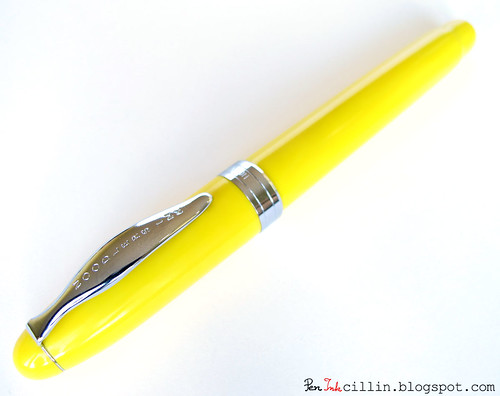
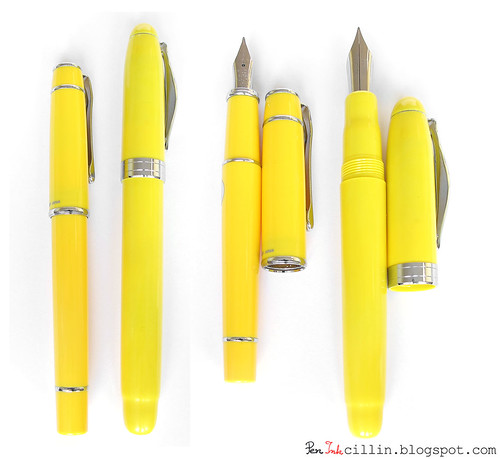
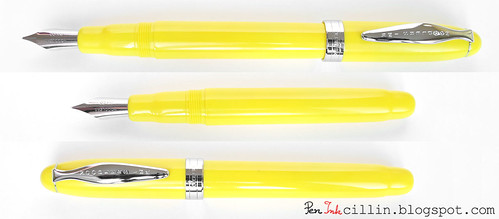
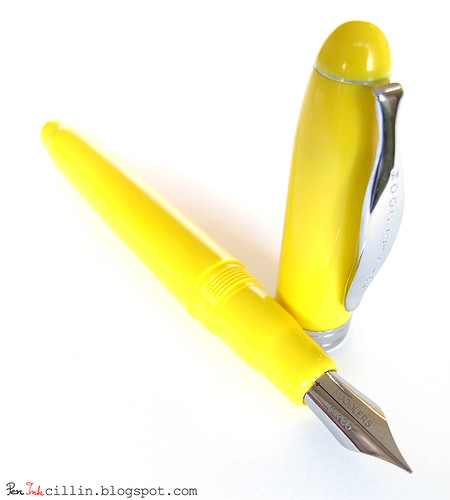



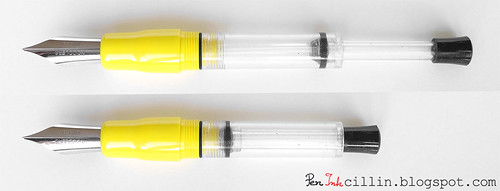

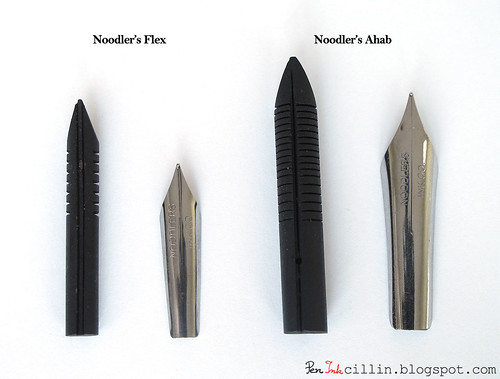
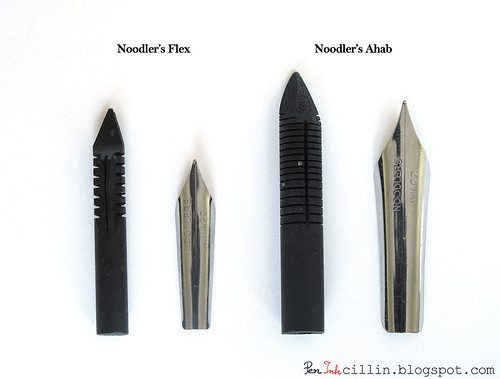
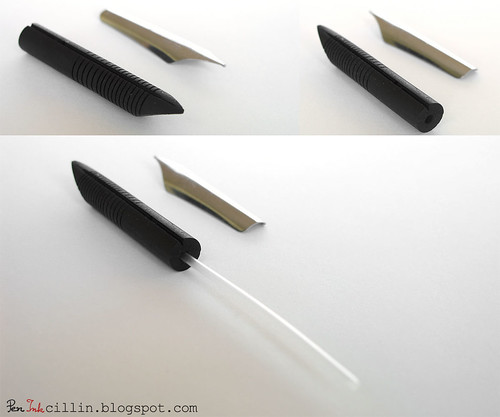
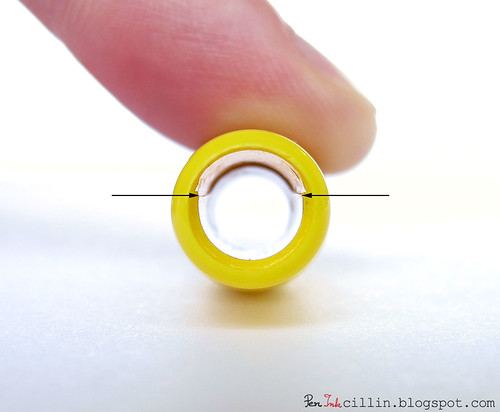
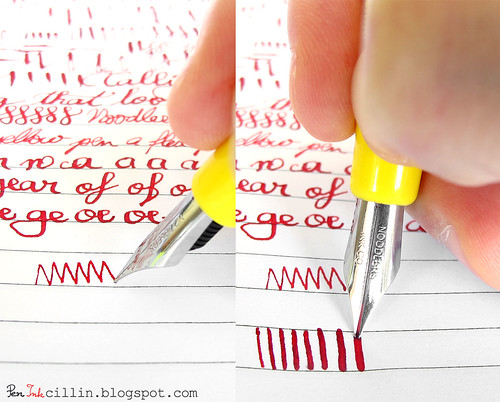

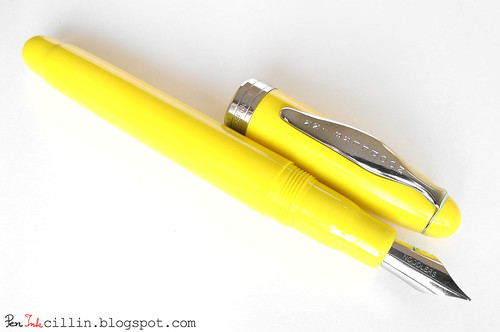

An excellent review. I have the clear demonstrator and am quite pleased with it.
ReplyDeleteThanks! Does it flow well?
ReplyDeleteFabulous write up. I have a clear demonstrator, and she seems to be writing well.
ReplyDeleteYes, the flow is very good. I have Diamine Denim in mine. While I love the color, I definitely should have loaded up the pen with a better shading ink like Noodler's Apache Sunset (one of my all time favorites) or Noodler's Black Swan in English Roses.
ReplyDeleteIf it's any consolation, the ink should run out soon. That's one thing I like about these flex pens: they use a lot of ink and that's a great excuse to try new inks.
ReplyDeleteWow! What a review.
ReplyDeleteIf I didn't already own six ahabs, I'd order one after reading this.
You cover every base and your pics are terrific.
Its the same kind of review that made me need to have a tswibi!
Awesome!
Tom, NYC
Thanks a lot Tom! I'm glad my work is not in vain. Maybe you should get another half-dozen Ahabs! Nah, just wait for Nathan's next creation.
ReplyDeleteCompletely intriguing... both in the actual subject and your own ultra-detailed approach with the review.
ReplyDeleteSadly for me,...(and I can ONLY speak for me) the Ahab was a waste of my
ReplyDeletetime and money (even though it was an inexpensive pen). I ended up
throwing it in the junk bin, which oddly enough was the same fate shared
by my other Noodler Flex pen from last year. I'm done with these pens.
I did everything recommended to prep the pen for first time use (mild
soap and water and repositioning the feed and nib etc.)and it never
worked right. I could never get ink to feed through. I understand that
sometimes you get a dud in the bunch, but 0-2? Seriously?
It was a very frustrating week of trying to get that thing to work and
it just never did. Even the simple plunger never drew ink. I guess I
could have used it as a dip pen, but even at that, it wasn't as good a
performer as my cheap Tank Master dip pen nibs
No pen is worth that amount of time and trouble right out of the
box....and especially when it results in lackluster performance. The
Ahab was a big disappointment for me and I guess the old expression,
"you get what you pay for" holds true for me in this instance.
I'm glad you liked my review but I'm sorry the Ahab didn't work out for you. It's quite possible that you got a dud but these pens are so simple that perhaps there's a different issue at stake.
ReplyDeleteFor example it is recommended that you vigorously scrub the feed with soap and a toothbrush. You could also try a different ink. Some inks simply don't want to flow well in certain pens.
Have you seen Tyler's review? He had the exact same problem. Initially thought it was junk but when he changed inks it worked like a charm.
Yes,...I scrubbed and flushed...(which really seems ridiculous considering it's a brand new pen)....this is the 2nd Noodler's that failed on me and honestly what puzzles me the most is when people on other forums tell me that my expectations are too high for such a cheap pen. That's a terrible excuse. I can go to the drug store, pick up a pen that is equally as advanced if not more than the Noodler's and they work without so much as a hiccup. Oh,..and they sell for about 5 bucks too! No scrubbing, scraping, rubbing, tapping, taking it apart or anything. Amazing. They just work.
ReplyDeleteI know others have had success with the Noodler's, so they CAN work out of the box, and I have no axe to grind with Nathan over there at Noodlers. It's really an issue with quality control at the factory in India or wherever these things are manufactured. I have discovered that I am not alone with these issues either. The list is growing.
Now,...on the flip side,....I contacted Goulet Pens (where I bought the Ahab from) and they were FANTASTIC!! They offered to remedy the situation any way that I wanted. I feel it's ok to voice one's opinion about a product, positive or negative, so long as you at least give the manufacturer or supplier a chance to react too. Goulet Pens has always been fair and I wanted to be sure that I make that clear here. We are trying to work this out and I can't ask for anything more than that.
They too shared with me that there have been some issues with the Ahab right out o the box.
Overall, the pen community consists of a wonderful group of people. They are quick to share and quick to help and that is most refreshing in today's climate. Your reviews here are insightful, unbiased and REALLY enjoyable. Thanks for your time and willingness to share your experiences with the rest of us.
I have a replacement Ahab on the way and THIS one will be dressed in Mandarin Yellow. I'm hopeful that luck and good fortune will be on my side this time as I nervously open the box.
I'm glad it worked out for you in the end. The Goulets are indeed top-notch.
ReplyDeleteNow here's the thing that I've noticed about fountain pens. The people on forums are right. You need to be prepared, especially when buying cheap pens, that it won't work satisfactorily or even at all! This happened to my Lamy AL-Star, which is a pen that approaches $50 with the converter. It wrote terribly right out of the box and then it stopped writing altogether. In the end I fixed it and it writes really nice but this does happen.
Nowadays fountain pens are made by machines and they aren't usually tested by hand. Sometimes flaws are introduced in the manufacturing process. When even pens costing hundreds of $ can suffer from these issues, you can imagine that a much cheaper pen can suffer the same.
As for cleaning a brand new fountain pen, that's an acceptable (and very indicated) practice these days. That's because feeds especially, but also plastic converters and other plastic parts, might be covered in machining oils. Oils prevent the flow of ink which can cause the pen to skip or it can even cut off ink flow entirely. That's why it is advisable to wash every new pen thoroughly with soapy detergent or ammonia solution.
A very thoughtful and detailed review---wonderful (and fantastic photos of the pens). I just purchased 2 Ahab pens (one for black/blue ink and one for red). I have removed the nib and feed and found it a little tricky to get them back in to where I wanted. But this is something that became easier with practice. As you mention several times, no pen of this price (or even twice this price) comes close. I agree with everything else you have said, too. I love my new Noodlers Ahab pens!
ReplyDeleteThank you thank you :)
ReplyDeleteI'm glad you like them. I actually found the nib/feed very easy to set back in, especially compared to the previous Noodler's Flex. The Ahab's section is keyed, as I showed in one of the photos and that makes it easy to center the nib and feed relative to each other.
Check out my blog http://blogoficialdovinicius.blogspot.com.br
ReplyDeleteI have an ahab and it constantly drips from the nib. I inked it up with noodlers antiatem and pushed the nib and feed all the way back,which as we all know would significantly slow ink flow or even stop it, but it continues to drip. I cant even write with it without having to worry that some glob of ink might spill out. To specify where the ink is coming from , its coming from inbetween the nib and feed, and sometimes even out of the grip section. I did not tweak the nib in any way and the space between the nib and feed is small enough that not even a paper can get inbetween it.
ReplyDeleteI am planning to buy a not too expensive flex pen shortly. Thank you for such a detailed review. I have found it very interesting and useful.
ReplyDeleteWonderful review. Exactly what I was looking for to take the plunge and buy one. Thanks!
ReplyDeleteI would take a look at the Konrad first. Same price, same flex nib, different filling system. I'm seriously considering buying a Konrad, even though it should function the same as the Ahab.
ReplyDeleteI got an Ahab from Goulet's about 5 weeks ago. I was willing to put in some work to get a great pen for $20. Cleaned it first, tried different nib/ feed alignments then got a specific tip on heat-setting the feed from the great folks at Goulet's. For me, the hardest part is getting the axial alignment of the feed and nib as close to spot-on as possible. But it has been writing well since. The smell of the celluloid whatsit 'plastic' brings back memories. Lots of stuff smelled like that when I was a kid. Size, shape and weight of the pen is great. I like holding it, seeing it and using it. Great for writing checks, the flex gives my handwriting extra character. Read the info here at Peninkcillin, saw Nathan's and Brian's videos about the Ahab, so I was able to jump in as knowledgeable as possible. But I want to thank Peninkcillin cause this review was my intro to the Ahab and Noodler's Ink.
ReplyDeleteWow thanks, makes me feel good to know that my reviews can be useful to folks! Have you considered a Konrad?
ReplyDelete